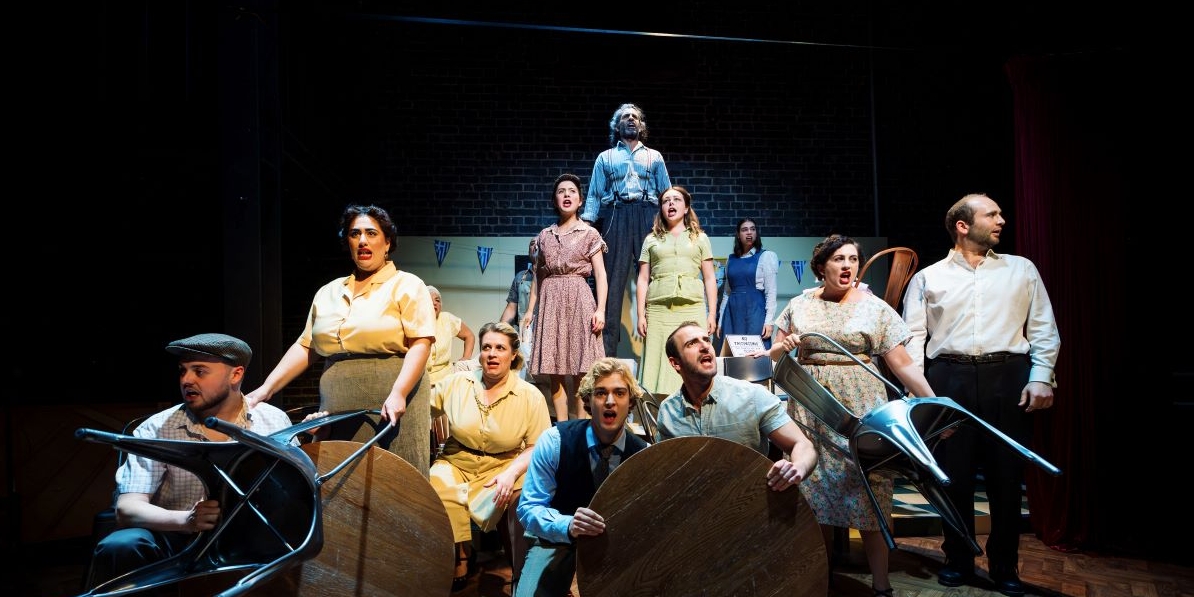‘There are Bernsteins and Blitzsteins, And flop Steins and hit Steins’, sings Mama Rose in ‘Gypsy’. Well, we all know where Bernstein stands, but as for Marc Blitzstein, his reputation still remains uncertain and shadowy despite a considerable output that covered opera, musicals and orchestral and instrumental genres. Part of the explanation rests with his distinctive outsider persona, as a gay, Jewish and Communist composer who found it hard to get his work performed. Another lies in the fact that there is a strand of stern didacticism in his stage works that can make them intimidating. He remains best known for his adaptation of the Brecht/Weill ‘Threepenny Opera’ and his own style approximates to their blend of lyrical ballads and sharp-edged satire.
Nevertheless he has a powerful advocate in Mehmet Ergen, artistic director at the Arcola Theatre, who presents the first UK performances of this work from 1941 which focuses on labour relations in the era of the Depression. The drama is set in a Greek-American social club which provides facilities for out-of-work labourers to give them some shelter from what we would now call precarity. News reaches them via two outsiders, Paul and Clara, that the main local employer, Clara’s brother, is planning to set up the town as a tourist resort. The son of the club’s leader, Joe, galvanises the workers to form a union in anticipation of this event but things turn nasty as the local boss and police connive to close down the club on trumped-up charges of illegal alcohol sales and a rival gang procured by the local elite torches the cafe and murders Joe. Right to the end though the community refuse to take ‘no for an answer.’
Blitzstein spent several years over this show and wrote a lot of music for it. The finished product shows the ebb and flow of inspiration. There are some exquisite numbers – notably ‘In the Clear’ – delivered with elegant simplicity by Mared Williams; the Cole Porter parody ‘Fraught’; and the very funny ‘Penny Candy’. But there are also a good number of choruses and solos which are unmemorable, wordy expositions, all fairly clumsy devices for moving the plot along. An artful director and highly committed cast do their best to inject energy and momentum but there are still quite a few points where energy seriously flags.
That said there are many plus points to the production. As so often at the Arcola, the restrictions and constraints of the space stimulate creativity as much impose limitations. Voices are uneven in quality, but the acting is universally plausible, with each character coming across clearly. The set flips between the cafe and a nightclub bar with minimal but sufficient changes between the too. There is excellent leadership and accompaniment from Dan Turek at the piano so that you don’t really miss an orchestra despite the fact that there are many solo interludes that cover scene changes. You definitely come away feeling that the best possible case has been made for the piece as a whole.
Among the large cast there are no obvious weak links but a number stand out for special consideration. Panayotis Petrakis presides with benign but firm authority over the social club acting as the moral touchstone for the evening, ending the show with fierce grief and stoic determination to continue the fight. As his son, Michalis Antoniou is fully to the pitch of the romantic and feisty aspects of the role, and is well matched by Katrina Michaels in the soubrette part of Francie. As the outsider couple, the intellectual Paul and initially pampered Clara, Ashley Gilmour and Mared Williams are well contrasted – we believe in the the trajectory covered by the well-meaning intellectual who does more harm than good, and the privileged girl who by the end is very much on the side of the workers. Sheelagh Ferrell offers a neatly knowing portrayal of the cabaret singer Bobbie and Vas Constani finds depth and humour in the rough-hewn character of Bulge.
So all in all, this production is a mixed bag. There is much of historical interest here – not least in realising how much Sondheim picked up from Blitzstein in how to build character through single numbers. It is a continuously intriguing evening. But not every neglected show is a lost masterpiece and I doubt we shall see this opera entering the general repertory.

